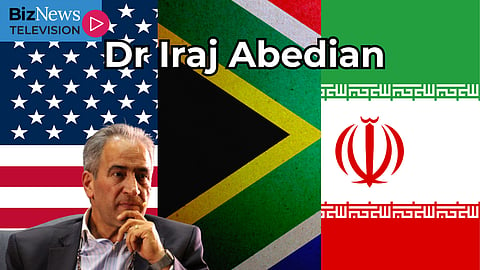SA’s risky balancing act: Ties with Iran, US tensions, and Trump’s influence – Dr. Iraj Abedian
South Africa's foreign policy is under intense scrutiny as it forges ahead with its genocide case against Israel while maintaining ties with Iran—one of the world's most oppressive regimes. With mounting economic pressure from the United States and shifting global alliances, is the country risking economic ruin for ideological consistency? Dr. Iraj Abedian dissects the contradictions, economic fallout, and what it will take for South Africa to recalibrate before it's too late.
Sign up for your early morning brew of the BizNews Insider to keep you up to speed with the content that matters. The newsletter will land in your inbox at 5:30am weekdays. Register here.
The seventh BizNews Conference, BNC#7, is to be held in Hermanus from March 11 to 13, 2025. The 2025 BizNews Conference is designed to provide an excellent opportunity for members of the BizNews community to interact directly with the keynote speakers, old (and new) friends from previous BNC events – and to interact with members of the BizNews team. Register for BNC#7 here.
If you prefer WhatsApp for updates, sign up to the BizNews channel here.
Watch here
Listen here
Highlights from the interview ___STEADY_PAYWALL___
South Africa's decision to push ahead with its genocide case against Israel at the International Court of Justice (ICJ) has placed the nation at the center of a geopolitical storm. With the United States increasing economic pressure, the move has sparked heated debate over whether South Africa's foreign policy is guided by principle or is recklessly endangering national interests.
Dr. Iraj Abedian, founder of Pan-African Capital, speaking to BizNews, provided a deep dive into the consequences of South Africa's position, highlighting glaring inconsistencies in the country's foreign policy stance.
The Syria factor: A selective outrage?
Dr. Abedian pointed out South Africa's silence on Iran's military involvement in Syria, where atrocities between 2013 and 2021 led to the deaths of over 750,000 people. These acts, including the use of chemical weapons by Bashar al-Assad's regime, were well-documented by the United Nations and human rights organizations. Yet, South Africa, despite its presence in international forums, remained silent while continuing to allow investments through MTN, a company that facilitated communication infrastructure in Syria and Iran.
"What was happening in Syria under the watchful eyes of our ambassador? Why was South Africa silent?" Dr. Abedian asked. He argued that this selective approach to human rights issues raises serious questions about the country's credibility on the international stage.
Iran's human rights abuses: Another blind spot
Beyond Syria, Iran's domestic policies are another contradiction in South Africa's foreign policy. Iran remains the only country with constitutionalized misogynistic laws, treating women as second-class citizens. The violent suppression of women, including chemical attacks on female students, continues unchecked.
Iranian human rights activist Narges Mohammadi, a Nobel Peace Prize laureate, is languishing in prison for her advocacy. Yet, South Africa's government has never formally condemned Iran's human rights abuses, despite being vocal about Israel's actions. "How can we justify our relationship with Iran when it enshrines gender apartheid into law?" Dr. Abedian asked.
The economic fallout: A risky path
South Africa's continued confrontation with the United States over Israel carries economic risks that could prove devastating. The country's alignment with Iran and Russia—two nations facing increasing global isolation—has already begun straining diplomatic and trade relations with the West.
Dr. Abedian warns that South Africa's economic structure is deeply intertwined with Western financial markets. While the government has been fixated on the African Growth and Opportunity Act (AGOA), he argues that the real danger lies in financial market dynamics. "Even the rollover of government bonds next May could run into problems," he cautioned, emphasizing that South Africa's reliance on European and American capital cannot be ignored.
Political analyst Dr. Frans Cronje recently told BizNews that South Africa is "fundamentally eliminating the concept of robust fixed investment into the country" due to its foreign policy choices. The risk of long-term economic stagnation is growing, and failure to course-correct could see foreign investment dry up, pushing South Africa into a prolonged low-growth trajectory.
Can South Africa reverse course?
The key question remains: is it too late to retrace South Africa's steps?
Dr. Abedian believes a recalibration is possible—but only if it is done strategically. "We cannot be headline-driven. We need a comprehensive realignment of foreign, economic, and local policies," he stressed. He called for an urgent government summit to reassess South Africa's long-term economic trajectory in the face of shifting global power structures.
Rather than doubling down on outdated diplomatic posturing, Dr. Abedian argues that South Africa must act pragmatically. This means engaging the United States not through reactionary rhetoric but through clear, sustainable policies that balance moral principles with economic realities.
A nation at a crossroads
South Africa's approach to global affairs has placed it in a precarious position. While upholding human rights and international law is commendable, the selective nature of its advocacy weakens its moral standing. Furthermore, the economic consequences of alienating key Western partners could be severe, especially in a time of global financial uncertainty.
If South Africa fails to adapt to the shifting global landscape, it risks isolating itself both diplomatically and economically. The time for nuanced, pragmatic diplomacy is now. Whether the government heeds this warning or continues its high-stakes gamble remains to be seen.
Read also

